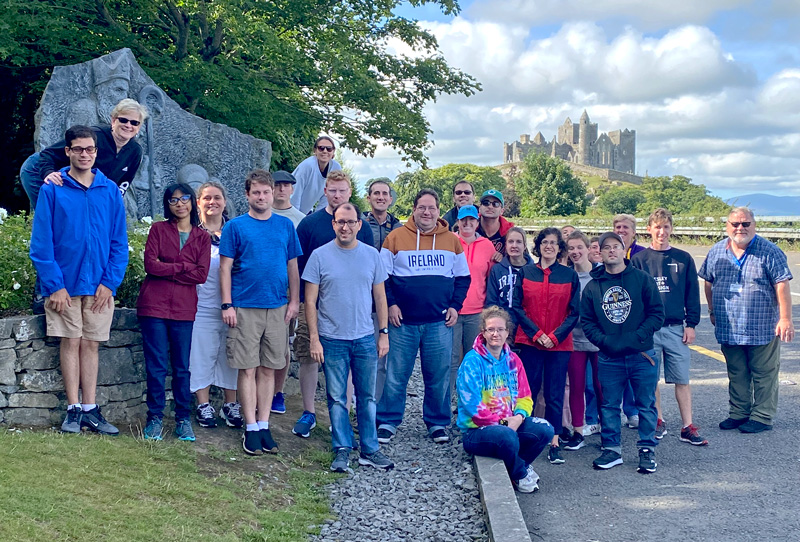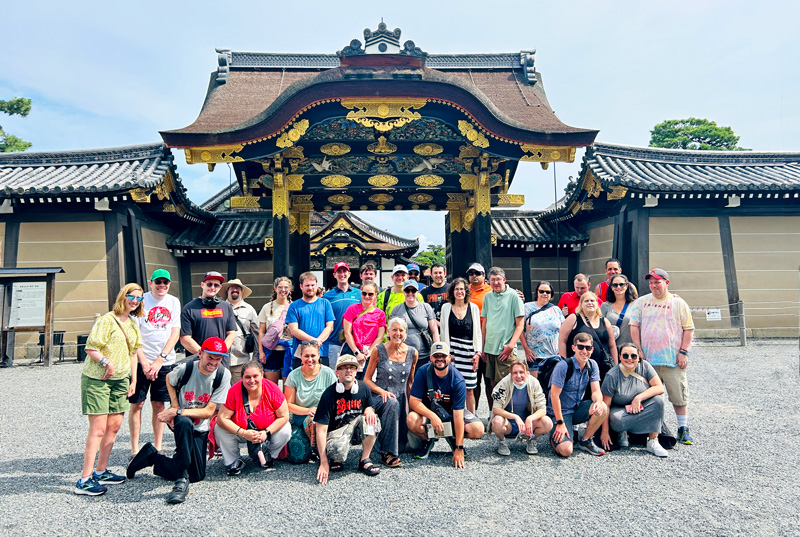“Travel makes one modest. You see what a tiny place you occupy in the world.”
– Gustave Flaubert
Anyone who has traveled abroad knows the feelings of wonder and excitement that come with exploring new places. Experiencing other cultures, customs, landscapes, food, art, and architecture expands our perspectives and helps us to understand that we are one small part of a much larger world. This understanding builds awareness, acceptance, and empathy for others.

An Embark Inclusive Travel tour group in front of the Rock of Cashel in Tipperary, Ireland
Travel challenges us by taking us out of our comfort zones and giving us new experiences we never could have anticipated. It teaches us flexibility and increases our tolerance for change and uncertainty in ways that feel exciting and meaningful, even when it’s also a little scary. Numerous studies document the positive impacts of travel on psychological well-being, life satisfaction, and even job performance (Chen & Petrick, 2013). Even short-term educational international travel yields deeply meaningful experiences for participants (Iskhakova et al., 2023).
For autistic travelers/travelers with autism, advance planning and the support of a travel group knowledgeable about disability inclusion and prepared for the common travel barriers faced by neurodivergent travelers can make international adventures more accessible, comfortable, and fun (Hamed, 2013). Inclusive travel opportunities are often group-based, and social engagement is an inherent part of the experience. Skilled group leaders for inclusive tours can facilitate connections between travelers who struggle to engage on their own. Staffed group outings, buddy systems, roommate pairings, and communal meals create natural shared experiences, which is an excellent foundation for new friendships.
Not only can group travel promote the development of friendships on tour, but it also helps international travelers connect with others when they get back home. In the (translated) words of medieval traveler Ibn Battuta, “Traveling leaves you speechless, then turns you into a storyteller.” Having an adventure gives us something interesting to talk about with other people. This is especially powerful for travelers who face barriers to developing strong social connections or making small talk. Stories about adaptive zip lining in Costa Rica, visiting a parmesan cheese factory in Italy, or that wild Karaoke night in Tokyo can spark interesting conversations.
Adults can find travel opportunities through for-profit and nonprofit organizations that specialize in adaptive or accessible travel. Nonprofits may subsidize spots for travelers with financial need. Many neurodivergent travelers can also thrive with non-specialized companies that design individual and group travel experiences for all adults, with or without disabilities. Group tours are typically carefully organized, may have travel insurance options, may be all-inclusive, sometimes offer monthly payment plans to help with saving and budgeting, and often have extensive emergency preparedness plans. For more information on accessible and inclusive travel, try internet search terms like “travel agencies for people with disabilities,” “accessible group tours,” “international travel and autism,” and related terms that fit your interests and background.

An Embark Inclusive Travel tour group at Nijyo Castle, Kyoto, Japan
When planning to travel, it’s important to consider the ways in which life abroad, even for short stretches, will be different than life at home. Planning ahead for these differences will minimize their impact and maximize enjoyment. Here are some things to plan ahead for:
Physical accessibility: Countries have varied laws about physical accessibility to public transportation, landmarks, hotels, restaurants, etc. It’s important to research the places you want to go. When traveling with a group, make sure the group leader or travel coordinator understands any accessibility features you need. Think about airplanes, buses, boats, trains, and other methods of transit that could be involved, as well as the pace and distances you may be expected to manage each day.
Food sensitivities and allergies: It’s not always easy to get allergy-sensitive meals in other countries, especially if you don’t speak the language. If you have a serious allergy or sensitivity, in addition to the usual precautions you would take at home, carry a note card with you that explains your allergy in English and in the local language of the place you are going so you can show it to food service workers, or have a free language translation app ready to help you communicate. Make sure fellow travelers, especially group leaders, are aware of your allergy.
Other health considerations: Talk to your doctors about upcoming international travel plans to find out if there are any vaccines or other precautions needed, and share important health information with group leaders as appropriate in case of emergency. Bring a wallet card that explains any serious medical conditions and lists your medications and dosages in English and the local language. Bring over-the-counter medications and hygiene products you use often; products abroad may be very different or hard to find. If you take prescription medications, consult with your provider on how to adjust the time you take them for any time change you’ll experience. Bring extras of your medications with you and carry your meds in your carry-on luggage, if possible, to avoid them getting lost in transit. Finally, make sure to look up rules for bringing prescription medication into the country you’re traveling to.
Changes in routine: The value of traveling is as much about the experiences you can’t predict as about the ones you’ve carefully planned out. If that thought gives you some anxiety, fear not. Routines are important, and there’s no question that international traveling disrupts those routines. Prepare yourself by previewing some of the possible changes, e.g., “The schedule for the day will be different than it is at home.” “The food is going to be different than what I usually have.” Knowing some of the changes in advance, even without being able to predict exactly what the experience will be like, can help the changes feel more manageable. It can be comforting to also think about what will stay the same: “I’ll still have my headphones and music with me.” “My cell phone plan will work there, so I can contact people back home.”
Communication: Many language translation apps are free, let you type and speak into them, and give you both text and audio in the local language that you can show or play it for locals when needed. It’s also becoming easier to use US cell phones and data plans in other countries, letting you stay in touch with loved ones and also contact local emergency services, a group leader, or your hotel front desk if you need help. Travelers worried about their ability to communicate their needs can also look into whether their destination participates in the Hidden Disabilities Sunflower network.
Money: Budgeting for daily expenses is hard, especially when using a different currency than you’re used to. Downloading a currency exchange app on your phone can help you understand what you’re spending. Buy a small amount of local currency from your bank in advance and put a travel flag on your accounts for any debit or credit cards you are bringing that require one to avoid issues abroad.
Packing: Pack light and only bring what you can easily manage on your own, but do bring things that make you comfortable. Understanding your daily itinerary and the weather will help you to pack appropriately. Make sure to look up airline regulations for carry-on vs checked luggage, and follow TSA rules for liquids/gels/creams to minimize disruption at security. If traveling with a group, consult with the group leader about what to pack and how to pack it. Make sure to leave room in your suitcase to bring back souvenirs!
Preparing to fly: Fear of flying can feel like a major barrier to international adventures, but treatment can help. Accessing psychotherapy or therapeutic flying desensitization programs in advance can help you learn coping strategies to reduce and manage anxiety. Travelers can also minimize sensory overload in airports and planes by wearing sunglasses, brimmed hats, noise reduction headphones, and layers for assorted temperatures, and by including comfort items and familiar snacks in their carry-on.
Get excited: International travel is a big commitment of time and resources, so make sure you’re headed for a destination you’re really excited about. Take time to do some online research about the place you’re going so you can understand and appreciate what you see. Celebrate yourself for making it happen!
Not convinced yet? These seasoned travelers are happy to share what they love about exploring the world:
“I feel like I’m living an adventurous life when I travel!” – Leslie, age 45
“I travel because I love to learn about the cultures of other countries. I feel independent and enjoy meeting new people. Traveling in a group makes me feel safe and secure.” – Brandon, age 33
“What I like about traveling is it’s a true adventure; you never know what you’re going to see, you never know what you’re going to run into, or what things will happen along the way that may be interesting.” – Victor, age 39
“The reason I love traveling is because it is a wonderful experience for new adventures and seeking new experiences.” – Olivia, age 32
Cara Streit, EdD, MSW, LCSW, is a psychotherapist and the founding director of Embark Inclusive Travel, a 501(c)(3) tax-exempt nonprofit organization designed to support adults with disabilities in experiencing the life-changing benefits of travel. For more information, email EmbarkInclusiveTravel@gmail.com and visit EmbarkInclusiveTravel.org.
References
Chen, C.-C., & Petrick, J. F. (2013). Health and Wellness Benefits of Travel Experiences: A Literature Review. Journal of Travel Research, 52(6), 709-719.
Hamed, H. M. (2013). Tourism and autism: An initiative study for how travel companies can plan tourism trips for autistic people. American Journal of Tourism Management, 2(1), 1- 14.
Hidden Disabilities Sunflower (2024). What is the Hidden Disabilities Sunflower? hdsunflower.com
Iskhakova, M., Bradly, A., & Ott, D. L. (2023). Meaningful short-term study abroad experiences: the role of destination in international educational tourism. Journal of Teaching in Travel & Tourism, 23(4), 400–424.





Madame/Sir:
Hi this is Mrs. Lisa Griffin, I have question it is: My younger daughter
Miss Katy griffin : has Autism and she just eats veggie straws and drinks water/
pediasure boost every day . But she won´t eat any other foods . And I would
need Ideas what foods to get her to eat. Any Suggestions? If so Please email me
back ASAP! Thank you.